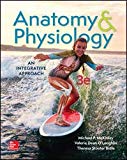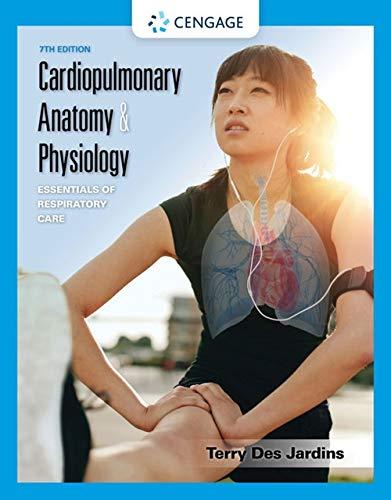
Loose Leaf For Anatomy & Physiology: An Integrative Approach
3rd Edition
ISBN: 9781260162493
Author: McKinley Dr., Michael; O'Loughlin, Valerie; Bidle, Theresa
Publisher: McGraw-Hill Education
expand_more
expand_more
format_list_bulleted
Concept explainers
Textbook Question
Chapter 12, Problem 7DYB
_____ 7. An action potential is generated when threshold is reached, at which time
- a. voltage-gated K+ channels close.
- b. voltage-gated Na+ channels open.
- c. chemically gated Na+ channels open.
- d. Ca2+ enters the cell.
Expert Solution & Answer
Want to see the full answer?
Check out a sample textbook solution
Students have asked these similar questions
Green Algae, as a group, is actually paraphyletic with one subgroup more closely related to higher plants than the other. Which of the following green algae groups is more closely related to higher plants:
a. Charophyceans
b. Chlorophyceans
c. Rhodophyta
d. Xanthophyceans
A single-celled green algal genus that is motile with 2 flagella, has a cup shaped chloroplast, and an eyespot:
a. Volvox
b. Chlamydomonas
c. Euglena
d. Codium
A[n] ___ is produced by members of the Myxomycota when there is a lack of moisture.
a. plasmodiocarp
b. aethalium
c. sclerotium
d. plasmodium
Chapter 12 Solutions
Loose Leaf For Anatomy & Physiology: An Integrative Approach
Ch. 12.1 - Prob. 1LOCh. 12.1 - Prob. 1WDLCh. 12.1 - Prob. 2LOCh. 12.1 - Prob. 3LOCh. 12.1 - What are the two primary functional divisions of...Ch. 12.1 - Prob. 4LOCh. 12.1 - Prob. 5LOCh. 12.2 - What are the three connective tissue wrappings in...Ch. 12.2 - Prob. 6LOCh. 12.2 - Prob. 4WDL
Ch. 12.2 - Prob. 7LOCh. 12.2 - Prob. 8LOCh. 12.2 - Prob. 5WDLCh. 12.2 - LEARNING OBJECTIVE
9. Distinguish between fast...Ch. 12.2 - Prob. 6WDLCh. 12.2 - Prob. 10LOCh. 12.2 - Prob. 11LOCh. 12.2 - Prob. 7WDLCh. 12.2 - Prob. 8WDLCh. 12.3 - Prob. 12LOCh. 12.3 - Prob. 13LOCh. 12.3 - Prob. 9WDLCh. 12.4 - Prob. 14LOCh. 12.4 - If a person has a brain tumor, is it more likely...Ch. 12.4 - Prob. 15LOCh. 12.4 - Prob. 11WDLCh. 12.4 - Prob. 12WDLCh. 12.4 - Prob. 16LOCh. 12.4 - Prob. 17LOCh. 12.4 - Prob. 13WDLCh. 12.5 - Prob. 18LOCh. 12.5 - Prob. 19LOCh. 12.5 - Prob. 14WDLCh. 12.5 - Prob. 15WDLCh. 12.6 - LEARNING OBJECTIVE
20. Distinguish between a pump...Ch. 12.6 - Prob. 16WDLCh. 12.6 - Prob. 21LOCh. 12.6 - LEARNING OBJECTIVE
22. Identify and describe the...Ch. 12.6 - Prob. 17WDLCh. 12.7 - Prob. 23LOCh. 12.7 - Prob. 18WDLCh. 12.7 - Prob. 24LOCh. 12.7 - Prob. 25LOCh. 12.7 - Prob. 26LOCh. 12.7 - Prob. 19WDLCh. 12.7 - Prob. 20WDLCh. 12.8 - Prob. 27LOCh. 12.8 - LEARNING OBJECTIVE
28. Compare and contrast the...Ch. 12.8 - Prob. 29LOCh. 12.8 - Prob. 1WDTCh. 12.8 - How are EPSP and IPSP graded potentials...Ch. 12.8 - LEARNING OBJECTIVE
30. Define summation, and...Ch. 12.8 - Prob. 22WDLCh. 12.8 - Prob. 31LOCh. 12.8 - Prob. 32LOCh. 12.8 - Prob. 33LOCh. 12.8 - How does depolarization and repolarization occur...Ch. 12.8 - Prob. 24WDLCh. 12.8 - Prob. 34LOCh. 12.8 - Prob. 35LOCh. 12.8 - Prob. 25WDLCh. 12.9 - Prob. 36LOCh. 12.9 - Prob. 26WDLCh. 12.9 - Prob. 37LOCh. 12.9 - Prob. 38LOCh. 12.9 - Prob. 27WDLCh. 12.9 - Prob. 39LOCh. 12.9 - Prob. 28WDLCh. 12.10 - Prob. 40LOCh. 12.10 - Prob. 41LOCh. 12.10 - Prob. 29WDLCh. 12.10 - LEARNING OBJECTIVE
42. Describe how acetylcholine...Ch. 12.10 - Prob. 43LOCh. 12.10 - WHAT DO YOU THINK?
2 Predict the general effect of...Ch. 12.10 - Prob. 30WDLCh. 12.10 - Prob. 44LOCh. 12.10 - Prob. 45LOCh. 12.10 - Prob. 31WDLCh. 12.11 - LEARNING OBJECTIVE
46. Identify the four different...Ch. 12.11 - Prob. 32WDLCh. 12.11 - Prob. 33WDLCh. 12 - _____ 1. The cell body of a neuron does all of the...Ch. 12 - Prob. 2DYBCh. 12 - Prob. 3DYBCh. 12 - Prob. 4DYBCh. 12 - Prob. 5DYBCh. 12 - Prob. 6DYBCh. 12 - _____ 7. An action potential is generated when...Ch. 12 - Prob. 8DYBCh. 12 - Prob. 9DYBCh. 12 - Prob. 10DYBCh. 12 - What are the four structural types of neurons? How...Ch. 12 - Prob. 12DYBCh. 12 - How does myelination differ between the CNS and...Ch. 12 - Describe the procedure by which a PNS axon may...Ch. 12 - Prob. 15DYBCh. 12 - Prob. 16DYBCh. 12 - Explain summation of EPSPs and IPSPs and the...Ch. 12 - Graph and explain the events associated with an...Ch. 12 - Prob. 19DYBCh. 12 - Prob. 20DYBCh. 12 - Prob. 1CALCh. 12 - Prob. 2CALCh. 12 - Prob. 3CALCh. 12 - Prob. 4CALCh. 12 - Sarah wants to call her new friend Julie and needs...Ch. 12 - Over a period of 6 to 9 months, Marianne began to...Ch. 12 - Prob. 2CSLCh. 12 - Prob. 3CSL
Additional Science Textbook Solutions
Find more solutions based on key concepts
An obese 55-year-old woman consults her physician about minor chest pains during exercise. Explain the physicia...
Biology: Life on Earth with Physiology (11th Edition)
Why do scientists think that all forms of life on earth have a common origin?
Genetics: From Genes to Genomes
Describe the role and impact of microbes on the earth.
Microbiology Fundamentals: A Clinical Approach
On what molecule does the anticodon appear? Explain the role of this molecule in protein synthesis.
Human Physiology: An Integrated Approach (8th Edition)
Knowledge Booster
Learn more about
Need a deep-dive on the concept behind this application? Look no further. Learn more about this topic, biology and related others by exploring similar questions and additional content below.Similar questions
- Which of the following is not true about the life-cycle of Fucus. a. 8 eggs per oogonium b. 64 sperm per antheridium c. eggs are flagellated d. sperm are flagellatedarrow_forwardGreen Algae, as a group, is actually paraphyletic with one subgroup more closely related to higher plants than the other. Which of the following green algae groups is more closely related to higher plants: a. Charophyceans b. Chlorophyceans c. Rhodophyta d. Xanthophyceansarrow_forwardCertain toxic terpenoids in this group is thought to deter herbivory but may also have some anti-tumor activity? a. green algae b. brown algae c. red algae d. golden algae e. none of thesearrow_forward
- In the cellular slime molds, the most common phase is: a. plasmodium b. pseudoplasmodial c. single cells as myxamoebae d. moundingarrow_forwardWhich of the following descriptive terms does not describe Hydrodictyon? a. colonial b. nonmotile c. 1 large reticulated chloroplast in each cell d. all of these describe Hydrodictyonarrow_forwardWhich of the following does not apply to Chara? a. "stoneworts" b. isogamous c. calcified walls d. apical growth with an axis and branchesarrow_forward
arrow_back_ios
SEE MORE QUESTIONS
arrow_forward_ios
Recommended textbooks for you
 Biology 2eBiologyISBN:9781947172517Author:Matthew Douglas, Jung Choi, Mary Ann ClarkPublisher:OpenStax
Biology 2eBiologyISBN:9781947172517Author:Matthew Douglas, Jung Choi, Mary Ann ClarkPublisher:OpenStax Concepts of BiologyBiologyISBN:9781938168116Author:Samantha Fowler, Rebecca Roush, James WisePublisher:OpenStax College
Concepts of BiologyBiologyISBN:9781938168116Author:Samantha Fowler, Rebecca Roush, James WisePublisher:OpenStax College Biology: The Dynamic Science (MindTap Course List)BiologyISBN:9781305389892Author:Peter J. Russell, Paul E. Hertz, Beverly McMillanPublisher:Cengage Learning
Biology: The Dynamic Science (MindTap Course List)BiologyISBN:9781305389892Author:Peter J. Russell, Paul E. Hertz, Beverly McMillanPublisher:Cengage Learning Cardiopulmonary Anatomy & PhysiologyBiologyISBN:9781337794909Author:Des Jardins, Terry.Publisher:Cengage Learning,
Cardiopulmonary Anatomy & PhysiologyBiologyISBN:9781337794909Author:Des Jardins, Terry.Publisher:Cengage Learning, Human Physiology: From Cells to Systems (MindTap ...BiologyISBN:9781285866932Author:Lauralee SherwoodPublisher:Cengage Learning
Human Physiology: From Cells to Systems (MindTap ...BiologyISBN:9781285866932Author:Lauralee SherwoodPublisher:Cengage Learning Human Biology (MindTap Course List)BiologyISBN:9781305112100Author:Cecie Starr, Beverly McMillanPublisher:Cengage Learning
Human Biology (MindTap Course List)BiologyISBN:9781305112100Author:Cecie Starr, Beverly McMillanPublisher:Cengage Learning

Biology 2e
Biology
ISBN:9781947172517
Author:Matthew Douglas, Jung Choi, Mary Ann Clark
Publisher:OpenStax

Concepts of Biology
Biology
ISBN:9781938168116
Author:Samantha Fowler, Rebecca Roush, James Wise
Publisher:OpenStax College

Biology: The Dynamic Science (MindTap Course List)
Biology
ISBN:9781305389892
Author:Peter J. Russell, Paul E. Hertz, Beverly McMillan
Publisher:Cengage Learning

Cardiopulmonary Anatomy & Physiology
Biology
ISBN:9781337794909
Author:Des Jardins, Terry.
Publisher:Cengage Learning,

Human Physiology: From Cells to Systems (MindTap ...
Biology
ISBN:9781285866932
Author:Lauralee Sherwood
Publisher:Cengage Learning

Human Biology (MindTap Course List)
Biology
ISBN:9781305112100
Author:Cecie Starr, Beverly McMillan
Publisher:Cengage Learning
The Cell Membrane; Author: The Organic Chemistry Tutor;https://www.youtube.com/watch?v=AsffT7XIXbA;License: Standard youtube license